中考英语复习之动词
图片预览
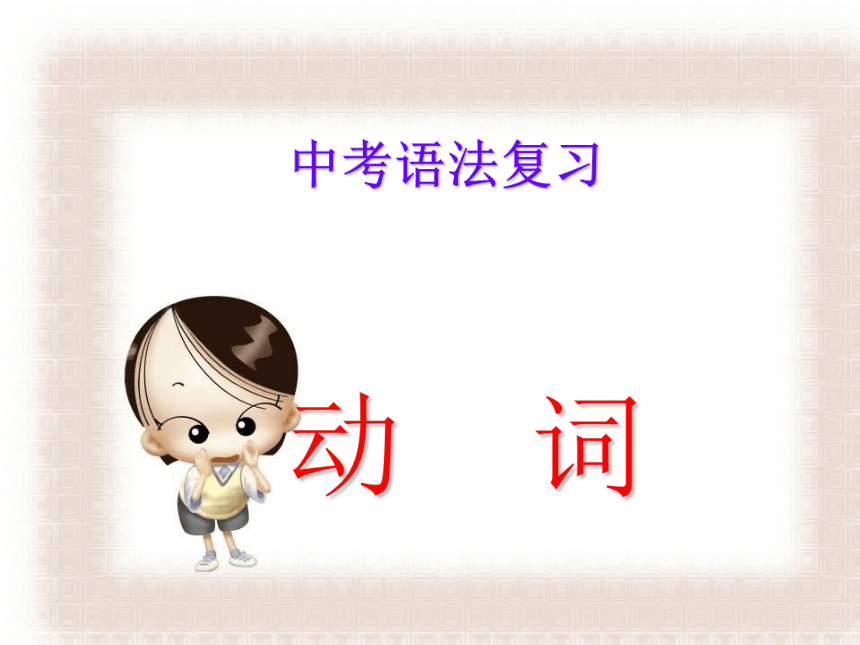
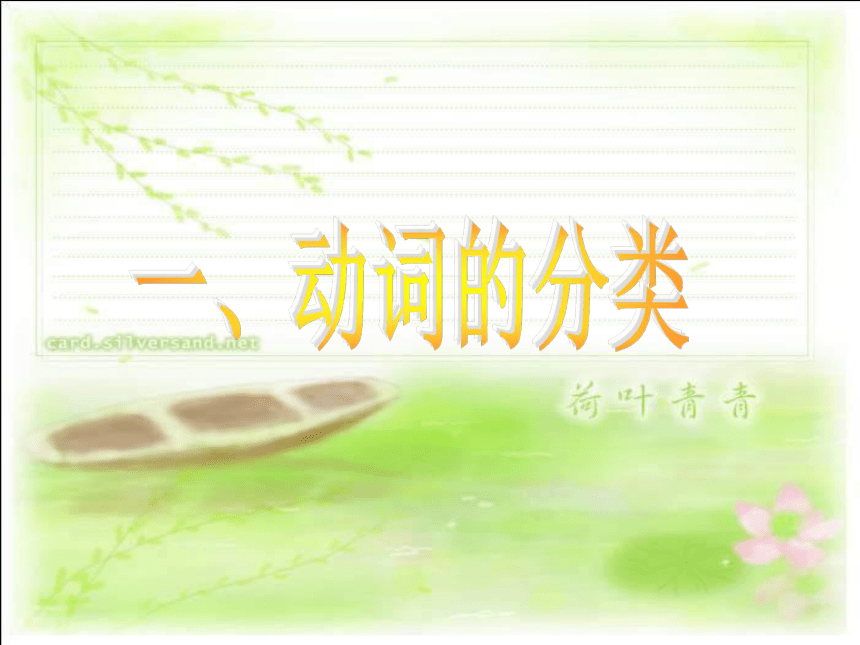
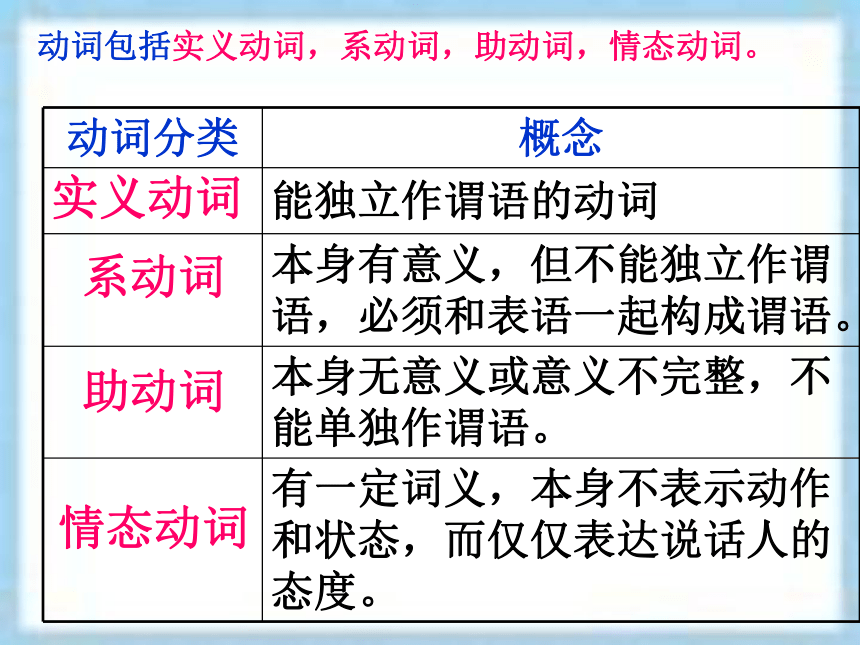
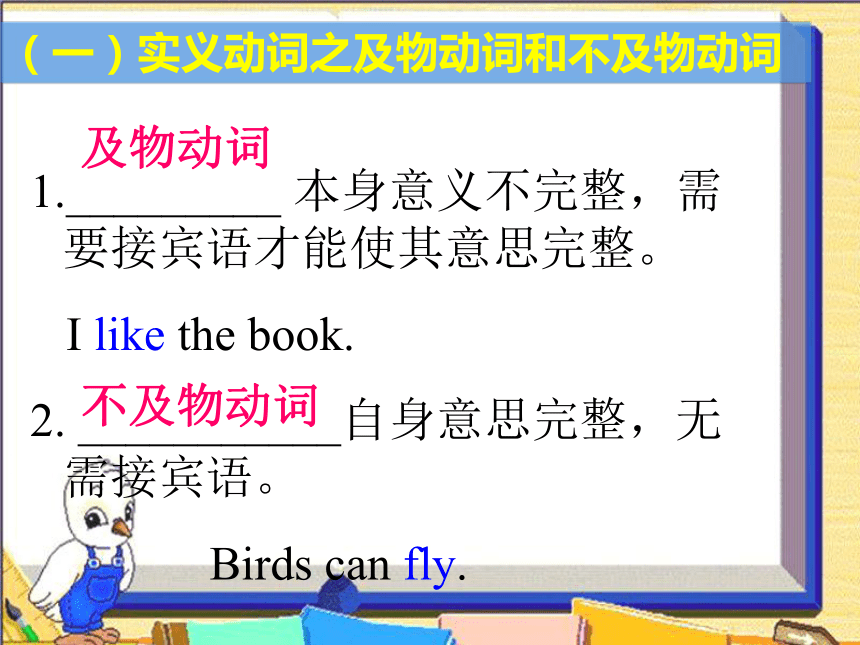
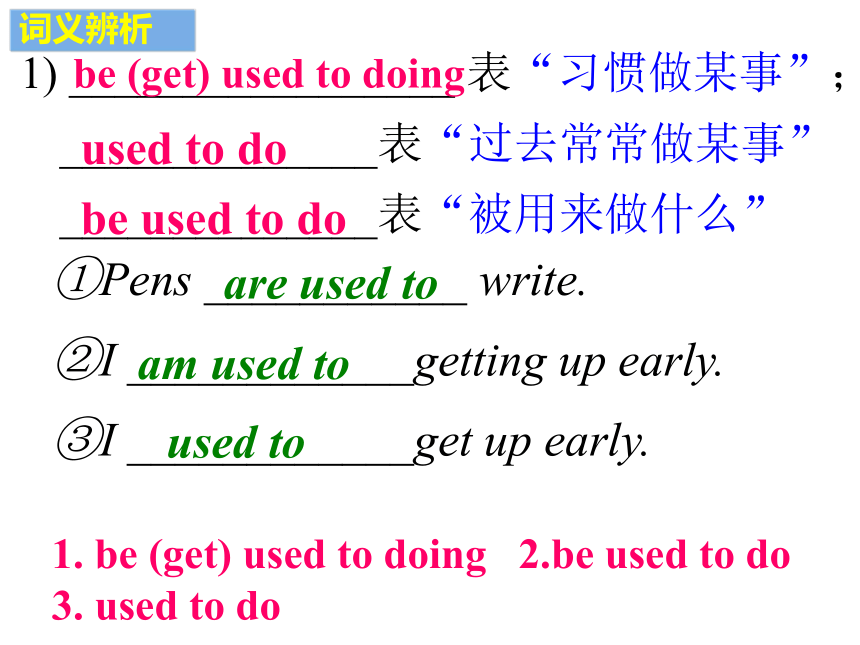
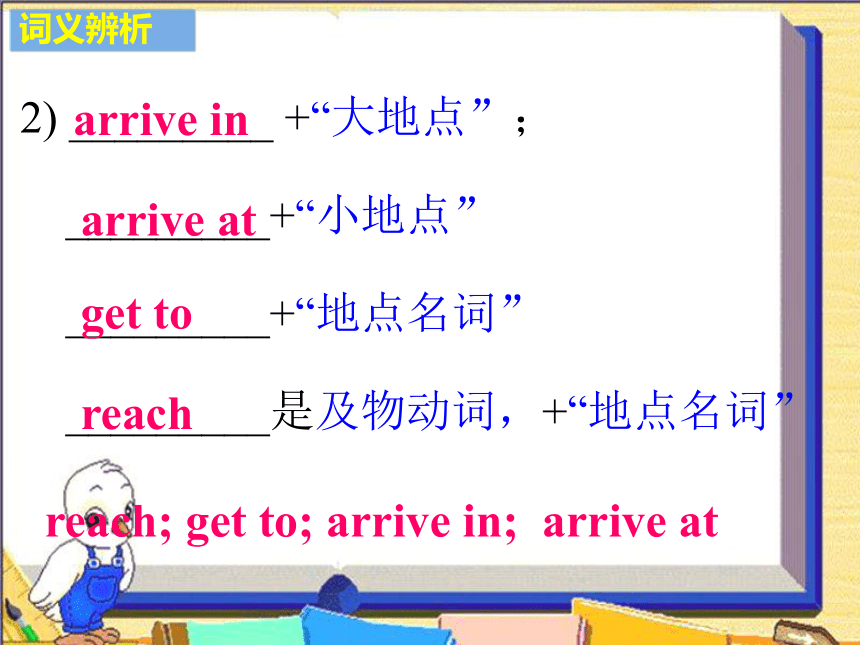
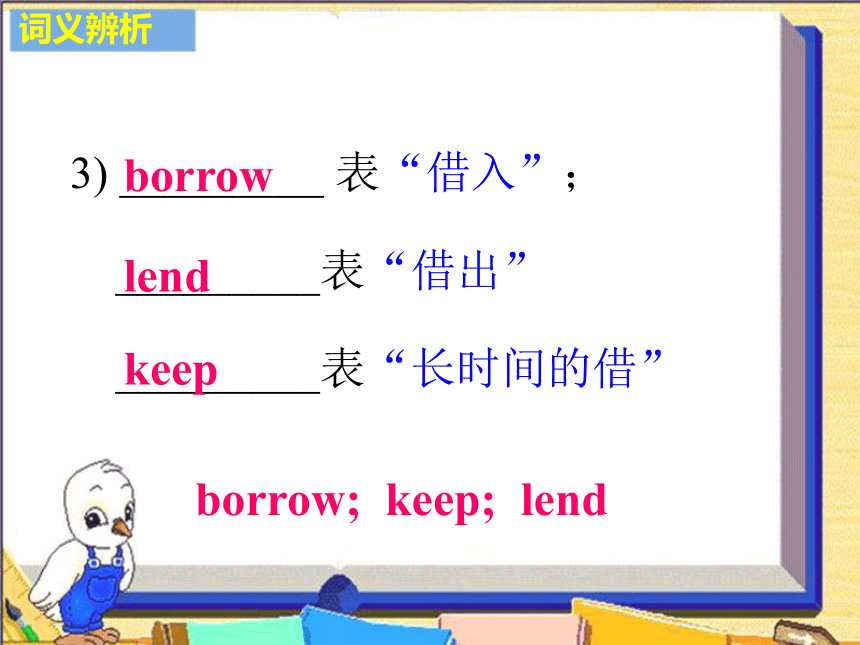
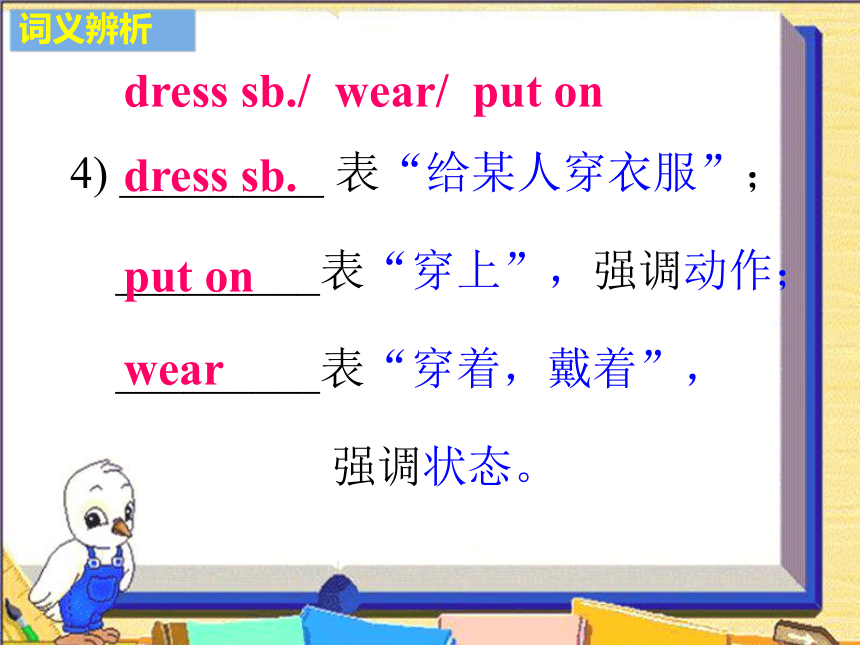
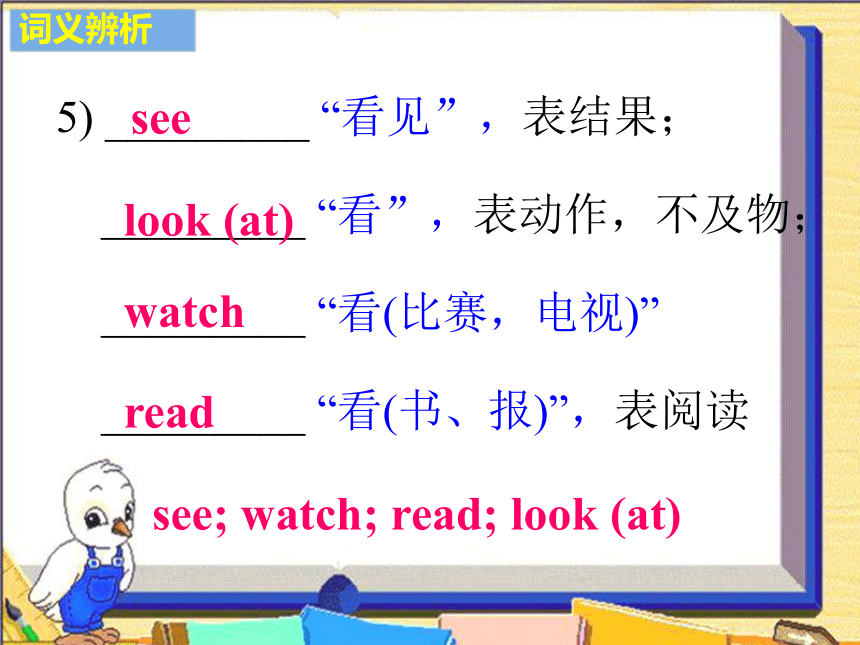
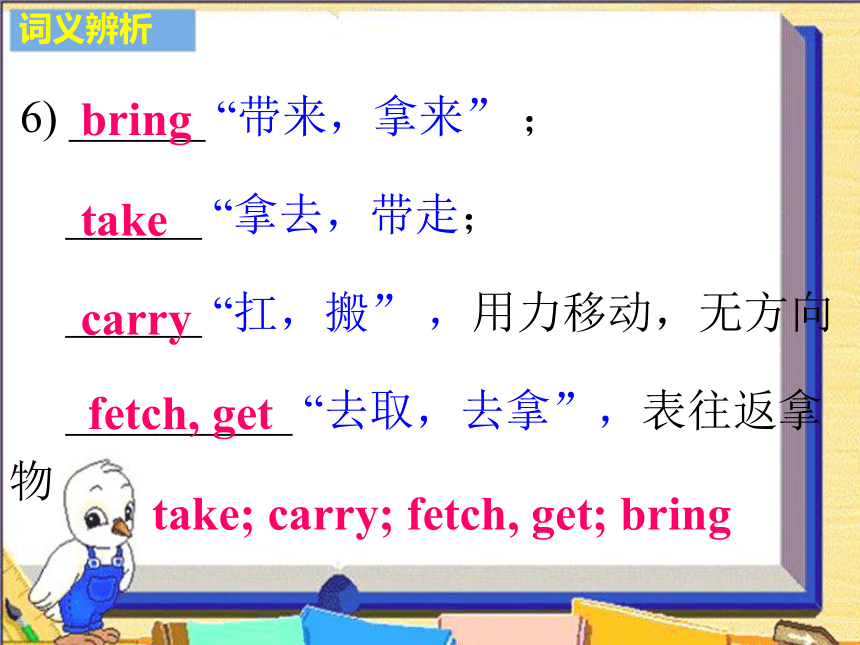
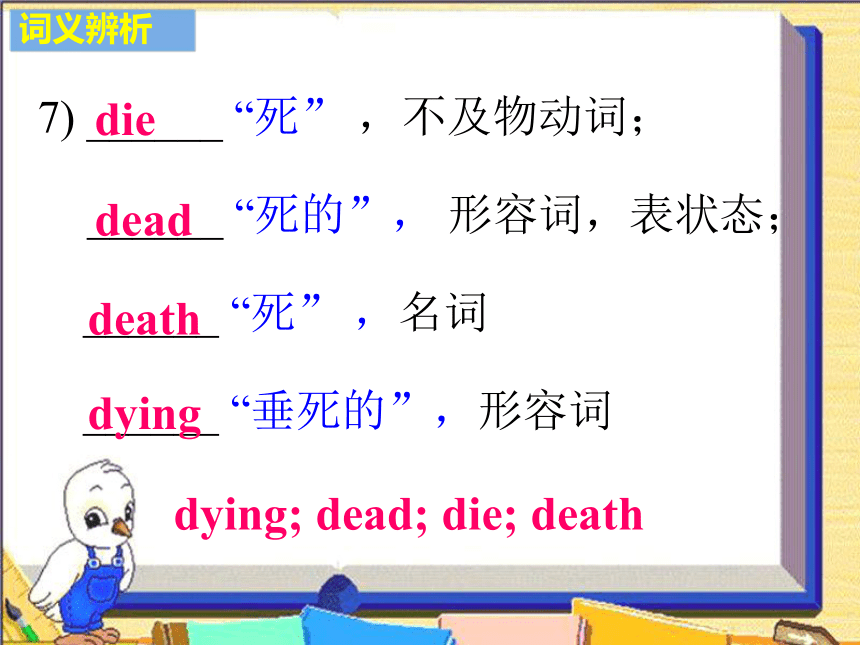
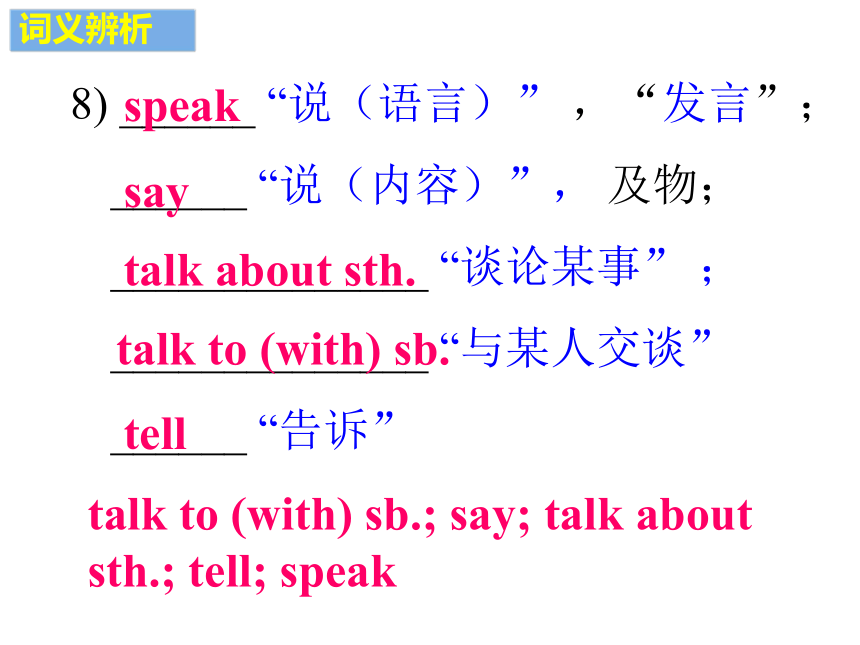
文档简介
课件169张PPT。中考语法复习动 词一、动词的分类实义动词系动词助动词情态动词动词包括实义动词,系动词,助动词,情态动词。(一)实义动词之及物动词和不及物动词_________ 本身意义不完整,需要接宾语才能使其意思完整。
I like the book.
2. ___________自身意思完整,无需接宾语。
Birds can fly.及物动词不及物动词词义辨析 1) _________________ 表“习惯做某事”;
______________表“过去常常做某事”
______________表“被用来做什么”be (get) used to doingused to dobe used to do①Pens ___________ write.
②I ____________getting up early.
③I ____________get up early.are used toam used toused to1. be (get) used to doing 2.be used to do 3. used to do词义辨析 2) _________ +“大地点”;
_________+“小地点”
_________+“地点名词”
_________是及物动词,+“地点名词”arrive inarrive atget toreachreach; get to; arrive in; arrive at词义辨析 3) _________ 表“借入”;
_________表“借出”
_________表“长时间的借”
borrowlendkeepborrow; keep; lend词义辨析 4) _________ 表“给某人穿衣服”;
_________表“穿上”,强调动作;
_________表“穿着,戴着”,
强调状态。
dress sb.put onweardress sb./ wear/ put on词义辨析 5) _________ “看见”,表结果;
_________ “看”,表动作,不及物;
_________ “看(比赛,电视)”
_________ “看(书、报)”,表阅读
seelook (at)watchreadsee; watch; read; look (at)词义辨析 6) ______ “带来,拿来” ;
______ “拿去,带走;
______ “扛,搬” ,用力移动,无方向
__________ “去取,去拿”,表往返拿物
bringtakecarryfetch, gettake; carry; fetch, get; bring词义辨析 7) ______ “死” ,不及物动词;
______ “死的”, 形容词,表状态;
______ “死” ,名词
______ “垂死的”,形容词
diedeaddeathdyingdying; dead; die; death词义辨析 8) ______ “说(语言)” ,“发言”;
______ “说(内容)”, 及物;
______________ “谈论某事” ;
______________ “与某人交谈”
______ “告诉” speaksaytalk about sth.talk to (with) sb.telltalk to (with) sb.; say; talk about sth.; tell; speak词义辨析 9) ______ “花钱(时间)” ,人做主语;
______ “花钱”, 人做主语;
______ “花钱” ,物做主语
______ “花时间”,物做主语(通常使用 在有It形式主语里)
spendpaycosttaketake; spend; pay; cost句型结构It takes/took sb some time/money to do sth做某事/买某物花某人多少时间/钱(It为形式主语)
sb pay some money for sth某人为某物花多少钱
sth/doing sth cost sb some time/money某物/做某事花某人多少时间/钱
sb spend some time/money on sth/(in) doing sth 某人花多少时间/钱在某物,事上/做某事词义辨析 10) ________ “寻找” ,强调过程;
________ “找到”, 强调结果;
________ “找出,查明(起因)”
________ “听”,强调过程
________“听到”,强调结果
look forfindfind outlisten (to)hearlisten (to); hearfind; find out; find词义辨析 11) ______ the game “赢”
______ the game “输”,
_____________ sb. “打败(某人)”
______ in the game “失败” winlosebeat (defeat)faillose; win; beat (defeat); fail词义辨析 12) _________ 表“丢失,失去”;
_________表“忘记”;
_________表“把某物落在某处”。
loseforgetleaveforget; lose; leave词义辨析 13) ____________ 表“想到…”;
____________表“考虑”;
____________表“仔细考虑”。
think ofthink aboutthink overthink about; think over; think of词义辨析 14) ______________ 表“加入”;
______________表“参加(活动)”;
______________表“出席(会议)”。
join (the party)take part inattend (a meeting)take part in; attend; join词义辨析 15) ____________red
____________dark
____________cold
____________short / long
turnget / growget / becomegetget ; become; grow; turn(二)系动词表“状态”:look, seem, taste, smell, feel, sound,
be, keep, stay2. 表“变化”:1.系动词+形容词
2.用法辨析turn, get, grow, fall, become,
come, go1.You look happy.
2.It tastes good.
3.It smells bad.状态变化系动词gocometurngrowfallget/
become(三)助动词。
1 帮助构成谓语动词的否定式It is not raining now.
I don’t like your new hat.2 帮助构成谓语动词的疑问式
Is it raining now?
Do you like my new hat?
He has been learning
English, hasn’t he?(四)情态动词情态动词用法辨析一. can , could, be able to
I. can
1)表“能力”
He can speak five languages.
2)表“许可”=may
Can (May) I come in ?3) 表“可能性”
Can it be true? 一. can , could, be able to4) be able to与can 的比较
A) 表示能力时可通用
No one can / is able to do it.
B) be able to可用于任何时态。
I’m sorry I haven’t been able to
answer your letter.
C) 表经努力办到某事,用be able to 。
After years of hard work he
was able to win the prize. 一. can , could, be able to
2. could
1) could 是can的过去时,可用来较委婉,客气地提出问题或陈述看法。
Could you come a little earlier?
2) can 和could 表示某人或某物一时的特点,译为“有可能,有时会”。
He can be very friendly.
He could be very proud.二. may, might
1)表许可,译为“可以”(正式场合)
You may take the book home.
2) 表示推测,“或许,可能” 。
It may rain tomorrow.
3) 表示祝愿
May you succeed!
4) might: may 的过去式,但might表可
能性较小,或表更婉转语气。
Jim may (might) lend you money.
Might I ask a question? 三. must, have to, need
1. must 的用法:
1) “必须” ,否定表禁止。回答其
问句用needn’t或don’t have to。
I must leave at 9.
--- Must we hand it in today?
--- Yes, you must.
No, you needn’t / don’t have to.
三. must, have to, need
1. must 的用法:
2) must 还可表示一种推断和揣测。must +do对现在事实的猜测;must +have done 对过去事实的猜测.
You must be joking.
I can’t find my key.
I must have left it in the bus.三. must, have to, need
2. must与 have to的比较:
A) have to--客观情况;must--主观看法。
I must learn another foreign language.
You have to learn another foreign
language if you want to work here.
B) have to用于不同时态,must不行.
We will have to buy another TV set. 三. must, have to, need
3. need 的用法:
1)作情态动词用时,用于疑问或否定句。回答need问句时,肯定用must,否定用needn’t / don’t have to.
You need not do anything here.
-- Need I go so soon?
-- Yes, you must.
No, you needn’t. / don’t have to. 三. must, have to, need
3. need 的用法:
2)need用做行为动词时的用法:
I need to buy a new dictionary.
My bike needs repairing /
needs to be repaired . 四. will 和 would 的用法:
1. 表示“意愿”
She won’t lend me the money.
2. 表“邀请”或“请求”
Will you give me a piece of paper?
3. would比will语气更温婉。
Would like something to eat?
五. shall, should的用法
A) shall的用法
用于第一人称, 表示征求意见。
Shall I turn on the light?
B) should的用法
表示劝告,建议。
You should study the article carefully.
2. 表示推测,译为 “可能,应该,该”。
He should arrive at noon.Choose the best answer 1. –How much money did you ____
on the dictionary?
--29 yuan.
A. pay B. spend
C. cost D. takeChoose the best answer 2. It _____ almost 10 years to build Panzhihua Ertan power station, the second largest power station in Asia.
A. spent B. took
C. cost D. paidChoose the best answerturn up/down/on/off的区别 turn up (音量)放大??光线?调亮 ?
turn down (音量)放小??光线?调暗
turn on 打开?开关、按钮? ?
turn off 关?开关、按钮?Choose the best answer 3. Would you please _____ the TV? I can hardly hear the conversation between the two speakers.
A. turn on B. turn up
C. turn off D. turn downChoose the best answer 4. Tom and Jim ______ friends since they met each other for the first time five years ago.
A. were B. have become
C. have made D. have been现在完成时表示过去已经开始,持续到现在的动作或状态,
往往和表示一段时间的 状语连用。Choose the best answer 5. I’m afraid the other students will ____ me because I can’t answer the question.
A. laugh at B. hear from
C. agree with D. wait forChoose the best answer 6. –Nancy, don’t always ____ that old jacket. It looks terrible.
--But I think it’s cool, Mom.
A. wear B. dress
C. put on D. take offChoose the best answer 7. No free plastic bags in the supermarket helps to ___ white pollution.
A. reduce B. remove
C. provide D. produceChoose the best answer 8. I am greatly interested in this painting. Something in it _______ the painter’s deep love for nature.
A. expects B. discusses
C. expresses D. imaginesChoose the best answer 9. –Oh, I’ve left my schoolbag in the
classroom.
--Don’t worry. I’ll ____ it for you.
A. bring B. get
C. take D. carryChoose the best answer 10. –What a nice MP3! Is it yours?
--Of course. I ____ 180 yuan on it.
A. cost B. took
C. spent D. paidChoose the best answer 11. –There’s too much sunshine.
--Yeah. We’d better _____
sunglasses.
A. put away B. put on
C. take off D. take outChoose the best answer 12. The doctor _____ a ____ boy yesterday.
A. had saved; dying
B. saved; dead
C. has saved; dead
D. saved; dyingChoose the best answer 1. The water _____ cool when I jumped into the pool for morning exercise.
A. was felt
B. is felt
C. felt
D. feels
系动词不用于被动语态Choose the best answerChoose the best answer2. He shook his head ______ and looked ____ when he was told the bad news.
A. sadly; sadly B. sad; sad
C. sadly; sad D. sad; sadly
Choose the best answerChoose the best answer3. I love to go to the forest in summer. It ____ good to walk in the forest or sit in the shade of trees.
A. does B. feels
C. gets D. makes
Choose the best answer4. ----I was wondering if we could go skating on the weekend.
----_____ good.
A. Sound B. Sounded C. Sounding D. SoundsChoose the best answerChoose the best answer1. The discussion_____ alive when an interesting topic was brought in.
A. was coming
B. had come
C. has come
D. came
2. The traffic lights_____ green and I pulled away.
A. came
B. grew
C. got
D. turned
3. --- Is your headache
getting _____?
--- No, it’s worse.
A. better
B. bad
C. less
D. well
后面有worse,反意词正好是better. 4. -----Would you advise me on how to stay_____?
-----Try to live regularly, eat more vegetables and be in a good state of mind.
A. health B. healthy
C. healthily
D. more healthily5. The dog looked______. The boy looked ____at the poor dog.
A. dead; sad
B. dying; sadly
C. deadly; sadly
D. dying; sad答:选B,第一空look为系动词,“看起来”,后接形容词,
由下文可知,小狗现在尚未死去,可用dying“快要死的”;
第二空look?为行为动词短语,后应用副词修饰,故只能用sadly,
即“那个男孩难过地看着那只可怜的小狗。 6. The cloth that she bought looks ____, feels _____ and sells_____.
A. beautiful; soft; well
B. beauty; softly; well
C. beautifully; softly; good
D. beautiful; soft; good
销售得很好,sell well ,但不能说是sell good 。well 在此是做副词(adv.),动词用在well后。 feel 摸起来……,是感官动词,后面要跟形容词(adj.)而softly是副词,所以只能用soft。 look 跟feel 其实是一样的道理,都是感官动词, beautiful是adj , beauty是名词,beautifully是副词。 大声朗读P122的考点四Choose the best answer 1. –Where is our head teacher, Mr. Li?
--He _____ be in the office. I saw him there just one or two minutes ago.
A. can B. may
C. might D. mustChoose the best answer 2. –Shall I tell him the news after class?
--You _____. I’ve told him already.
A. can’t B. mustn’t
C. shouldn’t D. needn’tChoose the best answer 3. –Mrs. Wang, Lingling came to see you just now.
--It ____ be Lingling. She’s gone to Hong Kong.
A. can B. can’t
C. must D. mustn’tChoose the best answer 4. Anna didn’t come to school today. I think she _____ be ill.
A. can B. has to
C. may D. shouldChoose the best answer 5. –Is Mr. Smith swimming in the pool, Harry?
--It _____ be him. I saw him go to the library just now.
A. may not B. can’t
C. needn’t D. mustn’tChoose the best answer 6. –Will you answer the telephone? It _____ be your mother.
--Sorry. I _____. I’m busy.
A. can; mustn’t B. will; can’t
C. may; can’t D. need; willChoose the best answer 7. Tony ____ go to the opera on Saturday because he’s going to have a meeting.
A. can’t B. might
C. mustn’t D. shouldChoose the best answer 9. –Look! It _____ be the new woman manager.
--It _____ be her. She has just left for Shanghai.
A. can; mustn’t B. must; can’t
C. must; mustn’t D. can’t; mustChoose the best answer 10. –I hit a tree on the way to meet my friend at the railway station.
--I’m sure you ____ have been driving too fast.
A. need B. should
C. will D. mustChoose the best answer 11. –Mum, ____ I go out to play?
--Yes, you can. But you must finish your homework first.
A. must B. may
C. will D. needChoose the best answer 12. Schools _____ allow students at least one hour a day for sports.
A. would B. might
C. should D. couldChoose the best answer 13. Ben, don’t drive too fast. You ____ hit others’ car.
A. may B. must
C. have to D. needChoose the best answer 14. –I was told to be here before eight.
--Oh, you _____. I’m sorry for not telling you that we have changed the plan.
A. must B. can’t
C. may D. needn’tChoose the best answer 15. –Never touch my computer while I’m away.
--I ______.
A. shouldn’t B. mustn’t
C. won’t D. don’t Choose the best answer 16. –I don’t mind telling you what I know.
--You ____. I’m not asking you for it.
A. needn’t B. mustn’t
C. may not D. can’tChoose the best answer1 17. –Let’s go to Taishan Park by taxi.
--It’s not far. We ____ take a taxi.
A. needn’t B. can’t
C. mustn’t D. couldn’t五、非谓语动词动词不定式动名词分词to dodoingdoing
done名词
形容词
副词名词
形容词
副词To see is to believe.
He likes to play.
He asked me to go.
I have a lot to do.
I’m here to meet you.Seeing is believing.
I like playing.an interesting book
a broken cup
They came in, singing.
Seeing from the hill,
our school looks nice.不定式和动名词作宾语 通常加不定式作宾语
want to go
2. keep, practice, suggest, enjoy, finish,
mind, avoid + doing
3. + to do (doing)
remember, forget, stop, go on不定式和动名词作宾语补足语 通常加不定式作宾补
want him to go
2. 使役动词
let,make, have (sb. do )
have sb. do
have sb. doing
have sth. done
3. 感官动词 “五看两听一感觉”
look (at), see, watch, notice, observe,
listen (to), hear, feel (sb. do / doing)1. Don’t let him ____ out alone
at night. He is young and
will be frightened.
A. go
B. goes
C. to go
D. going2. My father is not good at
cooking. He often asks my
mother _____.
A. to help him
B. to be helped
C. not to help him
D. how to help him3. In order to win the first place
in the contest, he practiced
_____ the English song, but
he found it difficult ____ the
lyrics.
A. to sing; to remember
B. to sing; remembering
C. singing; to remember
D. singing; remembering4. Mr Green asked us to stop
_____. So we stopped ____
to him at once.
A. talking; listening
B. to talk; listening
C. talking; to listen
D. to talk; to listen5. –What should we do to
fight H1N1 flu?
--We should wash hands often,
avoid ____ to crowded
places and so on.
A. go
B. going
C. gone
D. to go6. –John, my computer doesn’t
work.
--Why not ask Mr Liu ___ it?
A. to buy
B. not to buy
C. to check
D. not to check7. –What’s your plan for the
summer holidays?
--I’ve no idea, but I’ve decided
____ at home and have a
good rest first.
A. stay
B. to stay
C. stayed
D. staying8. We are going for a picnic
tomorrow. I’ll call Wendy
to make sure _____.
A. why to start
B. when to start
C. what to start
D. which to start9. –My brother’s ill in hospital.
--I’m sorry _____ that.
A. hear
B. hearing
C. heard
D. to hear10. She spends much time ____
English every day.
A. read
B. reading
C. to read
D. have read11. –Would you mind me _____?
--____. Do it as you like, please.
A. to play the piano; Good idea
B. playing the piano;
Of course not
C. playing the piano; Of course
D. play the piano; All right12. –Oh, terrible! I forgot ____ the
window. It’s windy.
--Really? Let’s go back home
quickly.
A. closing
B. to close
C. closed
D. close13. After the discussion, the
students asked their teacher
______ next.
A. which to do
B. what to do
C. how to do
D. why to do要填what to do。因为动词不定式to do是一个及物动词,所以它需要宾语,
what就做了to do的逻辑宾语。
what to do是问去做什么
how to do是问怎么去做 也就是做某事的方法
要用how to do的话?? 缺少宾语? 应该是how to do it14. On her way home Lucy saw
a thief ____ in a shop. She
stopped ____110 at once.
A. steal; call
B. to steal; call
C. stealing; to call
D. stealing; calling15. You’d better ____ too much
time playing computer games.
A. don’t pay
B. not to pay
C. to not spend
D. not spend16. –Do you know Armstrong?
--Yes. He is the first man
_____ on the moon.
A. walk
B. walks
C. to walk
D. walked当名词被序数词(first,second ,……last)修饰时,应用不定式作定语。
如:他是最后一个到的 He was the last to come 17. –Is Jack in the library?
--Maybe. I saw him ____ out
with some books just now.
A. going
B. go
C. to go
D. went18. –Dad, why should I stop ____
computer games?
--For your health, my boy,
I’m afraid you _____.
A. to play; must
B. playing; have to
C. to play; can
D. playing; may19. –How about ___ in the river
with us?
--Sorry, I can’t. My parents
often tell me ____ that.
A. swim; don’t do
B. swim; to do
C. swimming; not do
D. swimming; not to do20. –I’m tired these days because
of studying for physics.
--Why not ____ music? It can
make you _____.
A. listen to; to relax
B. listen to; relax
C. listening to; relax
D. listening to; to relax21. –Why did you buy a radio?
--______English.
A. Learn
B. Learning
C. To learn
D. Be learning22. Why not ____ your teacher
for help when you can’t finish
____ it by yourself?
A. ask; write
B. to ask; writing
C. ask; writing
D. asking; write23. If people ____ cutting down
the forest, they will have
no place ____.
A. keep; to live in
B. will keep; to live in
C. keep; to live
D. will keep; to live24. Would you mind ____ the TV?
Your father is working now.
A. turning up
B. turning down
C. to turn up
D. to turn down25. It’s very nice ____ pictures
for me.
A. of you to draw
B. for you to draw
C. for you drawing
D. of you drawing二、动词时态一般现在时主+ V 原 / V-(e)s1.经常性或习惯性的动作
时间标志:every …; always; often;
sometimes; at… ; never
on Sundays; once a week usually; 2. 客观真理,客观存在,科学事实主将从现第三人称单数的构成规则变化-sss-eseseseseses变y 为i 再加 -esiesies肯定:
否定:
疑问:她经常在回家前完成作业.She often finishes her homework before she goes homeShe doesn’t finish her homework before she goes homeDoes she often finish her homework before she goes home?谓语是行为动词时,否定和疑问句要借助助动词do或does,原来的行为动词要用原形.1. A: How often__ she exercise?
B: Twice a week.
A. do B. does C. doing
2. I ___ like to drink milk.
A. not B. doesn’t C. don’t
3. Good food and exercise __ me to study better.
A. help B. helps C. helping
4. I will let you know about it as soon as I ___ the news.
A. will get B. gets C. get5. He always___ school early and___ home late.
A.go to; comes back to
B.goes to; come back
C.goes to; comes back
6. __she__ eating mooncakes?
A. Is; like B.Do; like C.Does; like
7. “Does Wang Li___ English well?”
A. speak B.speaks C.say一般过去时主+ V-edtried our best表示过去某一时刻或某一段时间内所发生的动作或情况时间标志:yesterday;
the day before yesterday; last …;
…ago 等表示过去时间的词语动词过去式的构成规则变化不规则变化见BOOK 3edd变y 为i 再加 ed双写尾词加 ed
ededddpedped肯定:
否定:
疑问:Tom 刚才打了电话给她.Tom rang her just now.Tom didn’t ring her just now.Did Tom ring her just now?谓语是行为动词时,否定和疑问句要借助助动词did,原来的行为动词要用原形.1. It was too dark. So he ___ the lights and began to read books.
A. turned off B. turns on
C. turned on
2. The children __ at their uncle’s last night.
A. are B. were C. was
3. I am sorry that you have missed the train. It __ ten minutes ago.
A. left B. leaves C. will leave4. —These farmers have been to the United States.
—Really? When _____ there?
A. will they go
B. did they go
C. do they go
5. —Jim is not coming tonight.
—But he _______!
A. promises
B. promised
C. will promise一般将来时主 + is / am / are going to + V 原主 + will + V 原1.表示将来要发生的动作或存在的状态.2.时间、条件状语从句的主句部分(主将从现)1. —Do you know when the World Cup ___ next week?
—Next Friday. When it __ , I’ll ring you.
A. begins; begins
B. begins; will begin
C. will begin; begins
2. —Jimmy is leaving for a holiday.
—Really? Where _____ he _____?
A. does; go B. will; go C. did; go
3. —Shall we go to the Sand Lake tomorrow?
—Yes. We’ll go unless it _____ heavily.
A. will rain B. rained C. rains主 + was / were going to + V 原过去将来时would see him offwould have were going to have主 + would + V 原常用在宾语从句中1. He told me that he ___ to see us the next day.
A. comes B. would come
C. will come
2. The teacher told us that the sun ___ bigger than the earth.
A. is B. was C. will be
3. ---The plane is leaving right now, but Jim hasn't arrived yet. ---Well, he said he ___here on time. A came B would come C will be现在进行时主+ is / am / are +V-ingare getting ready for表示说话者说话时正在发生的动作表示目前一段时间内正在进行的动作.
(说话时动作不一定正在进行)现在分词的构成- inginging去掉e - ing先双写最后一个辅音字母- ingtinginging1. Where is James ? He ___ with his brother.
A. runs B. will run C. is running
2. Who ___ in the next room ? Mary is.
A. is singing B. is sing C. sings
3. Jimmy ____ for a holiday tomorrow.
A. is leaving B. leaves C. left
4. Look at the children over there.What __ ?
A. is he doing
B.are they doing
C.they are doing5. Look! The boy students are ___ football while the girls are ___. A. playing, dance B. playing, dancing
C. play, dancing
6. Mr. Smith __ short stories, but he __ a TV play these days. A. is writing, is writing
B. is writing, writes C. writes, is writing
7. I __ to the cinema. I __ there every Sunday. A. go. go B. am going, go
C. go. am going过去进行时was doing 主+ was / were +V-ing表示过去某时正在进行的状态或动作.1. The last time I __ Jane she __ cotton in the fields. ? A. see, was picking B. saw, picked
C. saw, was picking
2. I don ' t think Jim saw me; he ___ into space. ? A. just stared B. was just staring
C. has just stared
3. I first met Lisa three years ago. She ___ at a radio shop at the time. ? A. has worked B. was working
C. had been working4. ---Hey, watch the flowers!?
? ---Oh, I ' m terribly sorry. ________. ? A. I ' m not noticing B. I wasn ' t noticing
C. I don ' t notice
5. The reporter said that the UFO ___ east to west when he saw it. ? A. was traveling B. traveled
C. was to travel
6. I ___ my breakfast when the morning post came. ? A. had B. was having
C. have been having 现在完成时主+ have / has +PPhas lived in1. I ___ Enghish in this school since 1999.
A.taught B.have taught
C. would teach
2. Lilei ___ the pen for five years
A.has had B.bought C have bought
3. He ___ finished his homework yet
A.doesn’t B.haven’t C.hasn’t
4. — Peter lost his bike yesterday.
— ___ he ___ it yet?
A. Has; looked for B. Does; find
C. Has; found5. Who is he? I ____ before.
A. haven’t heard of
B. didn’t hear of
C. haven’t heard from
6. —Have you ever been to Guangzhou?
—No, I’ve __ been there.
A.never B. ever C. already
7. We haven't finished our homework___.
A.already B.ever C.yet
8. —Have you___learned English?
—Yes, I've ___ learned a lot.
A. already; ever B.ever; neve
C.ever; already 9. I ____ him these days.
A. haven’t hear from
B. didn’t hear of
C. haven’t heard from
10. I have __ 5,000 words so far.
A.learnt B. learn C. learning
11. The old man ______ China several times in the past 10 years.
A.has been to B.wen to C.goes tojust 刚刚
already 已经
before 之前
ever 曾经
never 从来没有
so far 到目前为止
yet 还(没有)[否定句]
these days 这些天
in the past …years / months
在过去的…年/ 月里for 时段
since 时点现在完成时的标志词for + 时段
since + 时段 + ago
since + 时点
It’s / It has been + 时段 + since + 一般过去时句子1. It’s ten years since she .
A.has left B.has been away C.left
2. I have been here __ 4 years.
A. since B. for C. from
3. We have learnt English __ six years ago.
A. since B. for C. from4. __ has been 5 years since we came here.
A. There B. It C. That
5. It’s three years since he the army .
A.has joined B.has been in C.joined
6. How many years is it ___ you graduated from junior high school? A. since B. for C. from 短暂性动词和延续性动词不
与
时
间
段
连
用可
与
时
间
段
连
用be (in) here / therebe a member ofbe deadbe onhavebe awaykeepbe overbe open (adj.)be closedbe married 1. —How long can I ____ this book?
—Two weeks
A.borrow B.keep C.lend
2. Her father___in 1990 and her husband___for more than five years.
A. has died, has died
B. has died, dead
C. died, has been dead
3. I have___ this nice watch for two years.
A. had B. bought C.borrowed
4. He___his home for ten years.
A. has left B. was away from
C.has been away from5. He___a League member for three years.
A. is B. has been C.has became
6. Lihua's brother has___for two years.
A. joined the army
B. been in the army
C. became a soldier
7. He hasn't____from Guangzhou ever since he left school
A.left B.been away C.been left
8. Betty ___ here for two hours. She ___ here at 8:00 this morning.
A. has been; came
B. has been; has come C. was; came8. The film ___ for five minutes.
A. began B. has been on C. has begun
6. You are too late. The shop ___ for many hours.
A. closed
B. has been closed
C. has closed
7. Mary ___ Tom in 2000. They ___ for 8 years.
A.married; have been married
B.married; have married
C.marries; have been married短语辨析He has been to Shanghai three times.He has been in Shanghai for ten years.He has gone to Shanghai and haven’t come back yet.在某地(多长时间)
现在仍在那里。
常与时段连用。曾去过某地(…次)
现在已不在那里。
可与just, ever, never等连用,去了…
还没有回来1. —May I speak to Ken?
—Sorry, he is out. He ___ see his teacher,
A. goes to B. has been to C.has gone to
2. Our teacher __ here since 2004.
A. has been in B. has been to
C. has been
3. —Have you ever ___ Huang shan?
—Yes, I’ve been there twice.
A. been to B. been in C.gone to
4. — Where’s Daming?
— He ____ the teachers’ office.
A. has been to B. have gone to
C. has gone to现在完成时与一般过去时的区别losthave lost表示动作发生的时间在过去
没有说明现在的情况表示过去的动作一直延续到现在甚至会继续下去或表示过去的动作对现在造成的影响1. — I have seen the film “Titanic”already.
—When ___ you __ it?
—The day before yesterday.
A. have;seen B. will;see C. did;see
2. Mr Black __ in China since five years ago.
A. lived B. has lived C. lives
3. We ___ trees last Sunday. So far we ___ over 3,000 trees there.
A. planted;planted
B. planted;have planted
C. have planted; planted过去完成时主+ had +PPhad startedhad learntby the end of1.I?lost?the?book?I?____.
A.have?bought? B.had?bought?
C.had?been? bought?
2. The?bus?had?gone?when?I__the?bus?stop.
? A.have?arrived? B.arrived?
C.had?arrived
3.Tom?_?of?visiting?his?grandmother,but?the?bad?weather?made?him?change?his?
mind.
? A.has?thought? B.thought?
C.had?thought?4.—Did?you?meet?Tom?at?the?airport?? —No,he?_?by?the?time?I?_?there.? A.has?left;got? B.had?left;arrived? C.left;arrived
?5.I?_?to?come?to?help?you.But?you?didn’t?
come? A.have?meant? B.had?meant?
C.meant?
6.Finally?Mary?was?admitted?by?Beijing?
University for?which?she?_?five?times.
A.had?tried? B.was?trying?
C.has?tried?时态总结三、动词的语态be + 动词的过去分词动作谁做的不知道;
The watch is made in China.
2. 说出谁做的没必要;
More trees must be planted.
3. 动作承受者很重要。
Chinese is spoken by many people.主动语态和被动语态的转换 We asked him to sing a song.
He was asked to sing a song (by us).
2. She gave me a book.
I was given a book (by her).
A book was given to me (by her).考点一主动语态和被动语态的转换4. He makes the girl stay at home.
The girl is made to stay at home by
him. (省略的to要还原)3. We should speak to old men politely.
Old man should be spoken to
politely. (介词不可省略)考点二考点三不使用被动语态的情况系动词用主动结构表被动意义。
Moon cakes taste delicious.
2. write, read, sell等词作不及物动词
时,他们的主语为物,可用主动语
态表被动意义。
The pen writes smoothly.
The shirt sells well.
3. My bike needs mending.
My bike needs to be mended.考点四考点五考点六 They won’t be back until
the work ______.A. do
B. does
C. is done
D. will do2. More than one answer
_____ to the question.A. have given
B. had given
C. were given
D. has been given3. ---How do you like the
material(材料)?
---Very much. It _____ soft.A. feels
B. is felt
C. is feeling
D. felt4. Mr Green is very angry with
you. He says you _____
away if you’re late again.A. are sending
B. has been sent
C. are going to send
D. will be sent5. The old should _____ in
our country.A. take good care of
B. be taken good care of
C. are take good care of
D. be take good care of6. The guide said that much
attention must ____ these
details.A. pay
B. be paid
C. pay to
D. be paid to7. –Did you go to the concert
yesterday?
--No, I ______.A. didn’t invite
B. haven’t invited
C. wasn’t invited
D. am not invited8. –How many cakes can I
have, Mum?
--None, dear. They ____
for your father.A. prepare
B. prepared
C. have prepared
D. were prepared9. It’s said that the Olympic
Torch Relay will _____
in July in Baotou.A. hold
B. be held
C. holding
D. to hold10. Things should _____
here before you enter
the Great Museum.A. keeps
B. keep
C. be kept
D. are kept11. –How clean the window is!
--Yes. It _____ just now.A. has been cleaned
B. was cleaned
C. is cleaned
D. will be cleaned12. It’s said in the newspaper
that 215 more new schools
____ in Zhengzhou by 2020.A. are building
B. were built
C. have built
D. will be built13. –Do you often clean
your classroom?
--Yes, our classroom
______ every day.A. clean
B. cleaned
C. Is cleaned
D. cleans14. –David, turn off the TV ____
no one is watching it.
--But it _____ off already!
The music is from the radio.A. so that, has been turned
B. when; has turned
C. if; has been turned
D. because; has turned15. When you leave the room,
make sure the door ____.A. was locked
B. is locked
C. will be locked
D. should be lockedThanks!
Bye-bye!
I like the book.
2. ___________自身意思完整,无需接宾语。
Birds can fly.及物动词不及物动词词义辨析 1) _________________ 表“习惯做某事”;
______________表“过去常常做某事”
______________表“被用来做什么”be (get) used to doingused to dobe used to do①Pens ___________ write.
②I ____________getting up early.
③I ____________get up early.are used toam used toused to1. be (get) used to doing 2.be used to do 3. used to do词义辨析 2) _________ +“大地点”;
_________+“小地点”
_________+“地点名词”
_________是及物动词,+“地点名词”arrive inarrive atget toreachreach; get to; arrive in; arrive at词义辨析 3) _________ 表“借入”;
_________表“借出”
_________表“长时间的借”
borrowlendkeepborrow; keep; lend词义辨析 4) _________ 表“给某人穿衣服”;
_________表“穿上”,强调动作;
_________表“穿着,戴着”,
强调状态。
dress sb.put onweardress sb./ wear/ put on词义辨析 5) _________ “看见”,表结果;
_________ “看”,表动作,不及物;
_________ “看(比赛,电视)”
_________ “看(书、报)”,表阅读
seelook (at)watchreadsee; watch; read; look (at)词义辨析 6) ______ “带来,拿来” ;
______ “拿去,带走;
______ “扛,搬” ,用力移动,无方向
__________ “去取,去拿”,表往返拿物
bringtakecarryfetch, gettake; carry; fetch, get; bring词义辨析 7) ______ “死” ,不及物动词;
______ “死的”, 形容词,表状态;
______ “死” ,名词
______ “垂死的”,形容词
diedeaddeathdyingdying; dead; die; death词义辨析 8) ______ “说(语言)” ,“发言”;
______ “说(内容)”, 及物;
______________ “谈论某事” ;
______________ “与某人交谈”
______ “告诉” speaksaytalk about sth.talk to (with) sb.telltalk to (with) sb.; say; talk about sth.; tell; speak词义辨析 9) ______ “花钱(时间)” ,人做主语;
______ “花钱”, 人做主语;
______ “花钱” ,物做主语
______ “花时间”,物做主语(通常使用 在有It形式主语里)
spendpaycosttaketake; spend; pay; cost句型结构It takes/took sb some time/money to do sth做某事/买某物花某人多少时间/钱(It为形式主语)
sb pay some money for sth某人为某物花多少钱
sth/doing sth cost sb some time/money某物/做某事花某人多少时间/钱
sb spend some time/money on sth/(in) doing sth 某人花多少时间/钱在某物,事上/做某事词义辨析 10) ________ “寻找” ,强调过程;
________ “找到”, 强调结果;
________ “找出,查明(起因)”
________ “听”,强调过程
________“听到”,强调结果
look forfindfind outlisten (to)hearlisten (to); hearfind; find out; find词义辨析 11) ______ the game “赢”
______ the game “输”,
_____________ sb. “打败(某人)”
______ in the game “失败” winlosebeat (defeat)faillose; win; beat (defeat); fail词义辨析 12) _________ 表“丢失,失去”;
_________表“忘记”;
_________表“把某物落在某处”。
loseforgetleaveforget; lose; leave词义辨析 13) ____________ 表“想到…”;
____________表“考虑”;
____________表“仔细考虑”。
think ofthink aboutthink overthink about; think over; think of词义辨析 14) ______________ 表“加入”;
______________表“参加(活动)”;
______________表“出席(会议)”。
join (the party)take part inattend (a meeting)take part in; attend; join词义辨析 15) ____________red
____________dark
____________cold
____________short / long
turnget / growget / becomegetget ; become; grow; turn(二)系动词表“状态”:look, seem, taste, smell, feel, sound,
be, keep, stay2. 表“变化”:1.系动词+形容词
2.用法辨析turn, get, grow, fall, become,
come, go1.You look happy.
2.It tastes good.
3.It smells bad.状态变化系动词gocometurngrowfallget/
become(三)助动词。
1 帮助构成谓语动词的否定式It is not raining now.
I don’t like your new hat.2 帮助构成谓语动词的疑问式
Is it raining now?
Do you like my new hat?
He has been learning
English, hasn’t he?(四)情态动词情态动词用法辨析一. can , could, be able to
I. can
1)表“能力”
He can speak five languages.
2)表“许可”=may
Can (May) I come in ?3) 表“可能性”
Can it be true? 一. can , could, be able to4) be able to与can 的比较
A) 表示能力时可通用
No one can / is able to do it.
B) be able to可用于任何时态。
I’m sorry I haven’t been able to
answer your letter.
C) 表经努力办到某事,用be able to 。
After years of hard work he
was able to win the prize. 一. can , could, be able to
2. could
1) could 是can的过去时,可用来较委婉,客气地提出问题或陈述看法。
Could you come a little earlier?
2) can 和could 表示某人或某物一时的特点,译为“有可能,有时会”。
He can be very friendly.
He could be very proud.二. may, might
1)表许可,译为“可以”(正式场合)
You may take the book home.
2) 表示推测,“或许,可能” 。
It may rain tomorrow.
3) 表示祝愿
May you succeed!
4) might: may 的过去式,但might表可
能性较小,或表更婉转语气。
Jim may (might) lend you money.
Might I ask a question? 三. must, have to, need
1. must 的用法:
1) “必须” ,否定表禁止。回答其
问句用needn’t或don’t have to。
I must leave at 9.
--- Must we hand it in today?
--- Yes, you must.
No, you needn’t / don’t have to.
三. must, have to, need
1. must 的用法:
2) must 还可表示一种推断和揣测。must +do对现在事实的猜测;must +have done 对过去事实的猜测.
You must be joking.
I can’t find my key.
I must have left it in the bus.三. must, have to, need
2. must与 have to的比较:
A) have to--客观情况;must--主观看法。
I must learn another foreign language.
You have to learn another foreign
language if you want to work here.
B) have to用于不同时态,must不行.
We will have to buy another TV set. 三. must, have to, need
3. need 的用法:
1)作情态动词用时,用于疑问或否定句。回答need问句时,肯定用must,否定用needn’t / don’t have to.
You need not do anything here.
-- Need I go so soon?
-- Yes, you must.
No, you needn’t. / don’t have to. 三. must, have to, need
3. need 的用法:
2)need用做行为动词时的用法:
I need to buy a new dictionary.
My bike needs repairing /
needs to be repaired . 四. will 和 would 的用法:
1. 表示“意愿”
She won’t lend me the money.
2. 表“邀请”或“请求”
Will you give me a piece of paper?
3. would比will语气更温婉。
Would like something to eat?
五. shall, should的用法
A) shall的用法
用于第一人称, 表示征求意见。
Shall I turn on the light?
B) should的用法
表示劝告,建议。
You should study the article carefully.
2. 表示推测,译为 “可能,应该,该”。
He should arrive at noon.Choose the best answer 1. –How much money did you ____
on the dictionary?
--29 yuan.
A. pay B. spend
C. cost D. takeChoose the best answer 2. It _____ almost 10 years to build Panzhihua Ertan power station, the second largest power station in Asia.
A. spent B. took
C. cost D. paidChoose the best answerturn up/down/on/off的区别 turn up (音量)放大??光线?调亮 ?
turn down (音量)放小??光线?调暗
turn on 打开?开关、按钮? ?
turn off 关?开关、按钮?Choose the best answer 3. Would you please _____ the TV? I can hardly hear the conversation between the two speakers.
A. turn on B. turn up
C. turn off D. turn downChoose the best answer 4. Tom and Jim ______ friends since they met each other for the first time five years ago.
A. were B. have become
C. have made D. have been现在完成时表示过去已经开始,持续到现在的动作或状态,
往往和表示一段时间的 状语连用。Choose the best answer 5. I’m afraid the other students will ____ me because I can’t answer the question.
A. laugh at B. hear from
C. agree with D. wait forChoose the best answer 6. –Nancy, don’t always ____ that old jacket. It looks terrible.
--But I think it’s cool, Mom.
A. wear B. dress
C. put on D. take offChoose the best answer 7. No free plastic bags in the supermarket helps to ___ white pollution.
A. reduce B. remove
C. provide D. produceChoose the best answer 8. I am greatly interested in this painting. Something in it _______ the painter’s deep love for nature.
A. expects B. discusses
C. expresses D. imaginesChoose the best answer 9. –Oh, I’ve left my schoolbag in the
classroom.
--Don’t worry. I’ll ____ it for you.
A. bring B. get
C. take D. carryChoose the best answer 10. –What a nice MP3! Is it yours?
--Of course. I ____ 180 yuan on it.
A. cost B. took
C. spent D. paidChoose the best answer 11. –There’s too much sunshine.
--Yeah. We’d better _____
sunglasses.
A. put away B. put on
C. take off D. take outChoose the best answer 12. The doctor _____ a ____ boy yesterday.
A. had saved; dying
B. saved; dead
C. has saved; dead
D. saved; dyingChoose the best answer 1. The water _____ cool when I jumped into the pool for morning exercise.
A. was felt
B. is felt
C. felt
D. feels
系动词不用于被动语态Choose the best answerChoose the best answer2. He shook his head ______ and looked ____ when he was told the bad news.
A. sadly; sadly B. sad; sad
C. sadly; sad D. sad; sadly
Choose the best answerChoose the best answer3. I love to go to the forest in summer. It ____ good to walk in the forest or sit in the shade of trees.
A. does B. feels
C. gets D. makes
Choose the best answer4. ----I was wondering if we could go skating on the weekend.
----_____ good.
A. Sound B. Sounded C. Sounding D. SoundsChoose the best answerChoose the best answer1. The discussion_____ alive when an interesting topic was brought in.
A. was coming
B. had come
C. has come
D. came
2. The traffic lights_____ green and I pulled away.
A. came
B. grew
C. got
D. turned
3. --- Is your headache
getting _____?
--- No, it’s worse.
A. better
B. bad
C. less
D. well
后面有worse,反意词正好是better. 4. -----Would you advise me on how to stay_____?
-----Try to live regularly, eat more vegetables and be in a good state of mind.
A. health B. healthy
C. healthily
D. more healthily5. The dog looked______. The boy looked ____at the poor dog.
A. dead; sad
B. dying; sadly
C. deadly; sadly
D. dying; sad答:选B,第一空look为系动词,“看起来”,后接形容词,
由下文可知,小狗现在尚未死去,可用dying“快要死的”;
第二空look?为行为动词短语,后应用副词修饰,故只能用sadly,
即“那个男孩难过地看着那只可怜的小狗。 6. The cloth that she bought looks ____, feels _____ and sells_____.
A. beautiful; soft; well
B. beauty; softly; well
C. beautifully; softly; good
D. beautiful; soft; good
销售得很好,sell well ,但不能说是sell good 。well 在此是做副词(adv.),动词用在well后。 feel 摸起来……,是感官动词,后面要跟形容词(adj.)而softly是副词,所以只能用soft。 look 跟feel 其实是一样的道理,都是感官动词, beautiful是adj , beauty是名词,beautifully是副词。 大声朗读P122的考点四Choose the best answer 1. –Where is our head teacher, Mr. Li?
--He _____ be in the office. I saw him there just one or two minutes ago.
A. can B. may
C. might D. mustChoose the best answer 2. –Shall I tell him the news after class?
--You _____. I’ve told him already.
A. can’t B. mustn’t
C. shouldn’t D. needn’tChoose the best answer 3. –Mrs. Wang, Lingling came to see you just now.
--It ____ be Lingling. She’s gone to Hong Kong.
A. can B. can’t
C. must D. mustn’tChoose the best answer 4. Anna didn’t come to school today. I think she _____ be ill.
A. can B. has to
C. may D. shouldChoose the best answer 5. –Is Mr. Smith swimming in the pool, Harry?
--It _____ be him. I saw him go to the library just now.
A. may not B. can’t
C. needn’t D. mustn’tChoose the best answer 6. –Will you answer the telephone? It _____ be your mother.
--Sorry. I _____. I’m busy.
A. can; mustn’t B. will; can’t
C. may; can’t D. need; willChoose the best answer 7. Tony ____ go to the opera on Saturday because he’s going to have a meeting.
A. can’t B. might
C. mustn’t D. shouldChoose the best answer 9. –Look! It _____ be the new woman manager.
--It _____ be her. She has just left for Shanghai.
A. can; mustn’t B. must; can’t
C. must; mustn’t D. can’t; mustChoose the best answer 10. –I hit a tree on the way to meet my friend at the railway station.
--I’m sure you ____ have been driving too fast.
A. need B. should
C. will D. mustChoose the best answer 11. –Mum, ____ I go out to play?
--Yes, you can. But you must finish your homework first.
A. must B. may
C. will D. needChoose the best answer 12. Schools _____ allow students at least one hour a day for sports.
A. would B. might
C. should D. couldChoose the best answer 13. Ben, don’t drive too fast. You ____ hit others’ car.
A. may B. must
C. have to D. needChoose the best answer 14. –I was told to be here before eight.
--Oh, you _____. I’m sorry for not telling you that we have changed the plan.
A. must B. can’t
C. may D. needn’tChoose the best answer 15. –Never touch my computer while I’m away.
--I ______.
A. shouldn’t B. mustn’t
C. won’t D. don’t Choose the best answer 16. –I don’t mind telling you what I know.
--You ____. I’m not asking you for it.
A. needn’t B. mustn’t
C. may not D. can’tChoose the best answer1 17. –Let’s go to Taishan Park by taxi.
--It’s not far. We ____ take a taxi.
A. needn’t B. can’t
C. mustn’t D. couldn’t五、非谓语动词动词不定式动名词分词to dodoingdoing
done名词
形容词
副词名词
形容词
副词To see is to believe.
He likes to play.
He asked me to go.
I have a lot to do.
I’m here to meet you.Seeing is believing.
I like playing.an interesting book
a broken cup
They came in, singing.
Seeing from the hill,
our school looks nice.不定式和动名词作宾语 通常加不定式作宾语
want to go
2. keep, practice, suggest, enjoy, finish,
mind, avoid + doing
3. + to do (doing)
remember, forget, stop, go on不定式和动名词作宾语补足语 通常加不定式作宾补
want him to go
2. 使役动词
let,make, have (sb. do )
have sb. do
have sb. doing
have sth. done
3. 感官动词 “五看两听一感觉”
look (at), see, watch, notice, observe,
listen (to), hear, feel (sb. do / doing)1. Don’t let him ____ out alone
at night. He is young and
will be frightened.
A. go
B. goes
C. to go
D. going2. My father is not good at
cooking. He often asks my
mother _____.
A. to help him
B. to be helped
C. not to help him
D. how to help him3. In order to win the first place
in the contest, he practiced
_____ the English song, but
he found it difficult ____ the
lyrics.
A. to sing; to remember
B. to sing; remembering
C. singing; to remember
D. singing; remembering4. Mr Green asked us to stop
_____. So we stopped ____
to him at once.
A. talking; listening
B. to talk; listening
C. talking; to listen
D. to talk; to listen5. –What should we do to
fight H1N1 flu?
--We should wash hands often,
avoid ____ to crowded
places and so on.
A. go
B. going
C. gone
D. to go6. –John, my computer doesn’t
work.
--Why not ask Mr Liu ___ it?
A. to buy
B. not to buy
C. to check
D. not to check7. –What’s your plan for the
summer holidays?
--I’ve no idea, but I’ve decided
____ at home and have a
good rest first.
A. stay
B. to stay
C. stayed
D. staying8. We are going for a picnic
tomorrow. I’ll call Wendy
to make sure _____.
A. why to start
B. when to start
C. what to start
D. which to start9. –My brother’s ill in hospital.
--I’m sorry _____ that.
A. hear
B. hearing
C. heard
D. to hear10. She spends much time ____
English every day.
A. read
B. reading
C. to read
D. have read11. –Would you mind me _____?
--____. Do it as you like, please.
A. to play the piano; Good idea
B. playing the piano;
Of course not
C. playing the piano; Of course
D. play the piano; All right12. –Oh, terrible! I forgot ____ the
window. It’s windy.
--Really? Let’s go back home
quickly.
A. closing
B. to close
C. closed
D. close13. After the discussion, the
students asked their teacher
______ next.
A. which to do
B. what to do
C. how to do
D. why to do要填what to do。因为动词不定式to do是一个及物动词,所以它需要宾语,
what就做了to do的逻辑宾语。
what to do是问去做什么
how to do是问怎么去做 也就是做某事的方法
要用how to do的话?? 缺少宾语? 应该是how to do it14. On her way home Lucy saw
a thief ____ in a shop. She
stopped ____110 at once.
A. steal; call
B. to steal; call
C. stealing; to call
D. stealing; calling15. You’d better ____ too much
time playing computer games.
A. don’t pay
B. not to pay
C. to not spend
D. not spend16. –Do you know Armstrong?
--Yes. He is the first man
_____ on the moon.
A. walk
B. walks
C. to walk
D. walked当名词被序数词(first,second ,……last)修饰时,应用不定式作定语。
如:他是最后一个到的 He was the last to come 17. –Is Jack in the library?
--Maybe. I saw him ____ out
with some books just now.
A. going
B. go
C. to go
D. went18. –Dad, why should I stop ____
computer games?
--For your health, my boy,
I’m afraid you _____.
A. to play; must
B. playing; have to
C. to play; can
D. playing; may19. –How about ___ in the river
with us?
--Sorry, I can’t. My parents
often tell me ____ that.
A. swim; don’t do
B. swim; to do
C. swimming; not do
D. swimming; not to do20. –I’m tired these days because
of studying for physics.
--Why not ____ music? It can
make you _____.
A. listen to; to relax
B. listen to; relax
C. listening to; relax
D. listening to; to relax21. –Why did you buy a radio?
--______English.
A. Learn
B. Learning
C. To learn
D. Be learning22. Why not ____ your teacher
for help when you can’t finish
____ it by yourself?
A. ask; write
B. to ask; writing
C. ask; writing
D. asking; write23. If people ____ cutting down
the forest, they will have
no place ____.
A. keep; to live in
B. will keep; to live in
C. keep; to live
D. will keep; to live24. Would you mind ____ the TV?
Your father is working now.
A. turning up
B. turning down
C. to turn up
D. to turn down25. It’s very nice ____ pictures
for me.
A. of you to draw
B. for you to draw
C. for you drawing
D. of you drawing二、动词时态一般现在时主+ V 原 / V-(e)s1.经常性或习惯性的动作
时间标志:every …; always; often;
sometimes; at… ; never
on Sundays; once a week usually; 2. 客观真理,客观存在,科学事实主将从现第三人称单数的构成规则变化-sss-eseseseseses变y 为i 再加 -esiesies肯定:
否定:
疑问:她经常在回家前完成作业.She often finishes her homework before she goes homeShe doesn’t finish her homework before she goes homeDoes she often finish her homework before she goes home?谓语是行为动词时,否定和疑问句要借助助动词do或does,原来的行为动词要用原形.1. A: How often__ she exercise?
B: Twice a week.
A. do B. does C. doing
2. I ___ like to drink milk.
A. not B. doesn’t C. don’t
3. Good food and exercise __ me to study better.
A. help B. helps C. helping
4. I will let you know about it as soon as I ___ the news.
A. will get B. gets C. get5. He always___ school early and___ home late.
A.go to; comes back to
B.goes to; come back
C.goes to; comes back
6. __she__ eating mooncakes?
A. Is; like B.Do; like C.Does; like
7. “Does Wang Li___ English well?”
A. speak B.speaks C.say一般过去时主+ V-edtried our best表示过去某一时刻或某一段时间内所发生的动作或情况时间标志:yesterday;
the day before yesterday; last …;
…ago 等表示过去时间的词语动词过去式的构成规则变化不规则变化见BOOK 3edd变y 为i 再加 ed双写尾词加 ed
ededddpedped肯定:
否定:
疑问:Tom 刚才打了电话给她.Tom rang her just now.Tom didn’t ring her just now.Did Tom ring her just now?谓语是行为动词时,否定和疑问句要借助助动词did,原来的行为动词要用原形.1. It was too dark. So he ___ the lights and began to read books.
A. turned off B. turns on
C. turned on
2. The children __ at their uncle’s last night.
A. are B. were C. was
3. I am sorry that you have missed the train. It __ ten minutes ago.
A. left B. leaves C. will leave4. —These farmers have been to the United States.
—Really? When _____ there?
A. will they go
B. did they go
C. do they go
5. —Jim is not coming tonight.
—But he _______!
A. promises
B. promised
C. will promise一般将来时主 + is / am / are going to + V 原主 + will + V 原1.表示将来要发生的动作或存在的状态.2.时间、条件状语从句的主句部分(主将从现)1. —Do you know when the World Cup ___ next week?
—Next Friday. When it __ , I’ll ring you.
A. begins; begins
B. begins; will begin
C. will begin; begins
2. —Jimmy is leaving for a holiday.
—Really? Where _____ he _____?
A. does; go B. will; go C. did; go
3. —Shall we go to the Sand Lake tomorrow?
—Yes. We’ll go unless it _____ heavily.
A. will rain B. rained C. rains主 + was / were going to + V 原过去将来时would see him offwould have were going to have主 + would + V 原常用在宾语从句中1. He told me that he ___ to see us the next day.
A. comes B. would come
C. will come
2. The teacher told us that the sun ___ bigger than the earth.
A. is B. was C. will be
3. ---The plane is leaving right now, but Jim hasn't arrived yet. ---Well, he said he ___here on time. A came B would come C will be现在进行时主+ is / am / are +V-ingare getting ready for表示说话者说话时正在发生的动作表示目前一段时间内正在进行的动作.
(说话时动作不一定正在进行)现在分词的构成- inginging去掉e - ing先双写最后一个辅音字母- ingtinginging1. Where is James ? He ___ with his brother.
A. runs B. will run C. is running
2. Who ___ in the next room ? Mary is.
A. is singing B. is sing C. sings
3. Jimmy ____ for a holiday tomorrow.
A. is leaving B. leaves C. left
4. Look at the children over there.What __ ?
A. is he doing
B.are they doing
C.they are doing5. Look! The boy students are ___ football while the girls are ___. A. playing, dance B. playing, dancing
C. play, dancing
6. Mr. Smith __ short stories, but he __ a TV play these days. A. is writing, is writing
B. is writing, writes C. writes, is writing
7. I __ to the cinema. I __ there every Sunday. A. go. go B. am going, go
C. go. am going过去进行时was doing 主+ was / were +V-ing表示过去某时正在进行的状态或动作.1. The last time I __ Jane she __ cotton in the fields. ? A. see, was picking B. saw, picked
C. saw, was picking
2. I don ' t think Jim saw me; he ___ into space. ? A. just stared B. was just staring
C. has just stared
3. I first met Lisa three years ago. She ___ at a radio shop at the time. ? A. has worked B. was working
C. had been working4. ---Hey, watch the flowers!?
? ---Oh, I ' m terribly sorry. ________. ? A. I ' m not noticing B. I wasn ' t noticing
C. I don ' t notice
5. The reporter said that the UFO ___ east to west when he saw it. ? A. was traveling B. traveled
C. was to travel
6. I ___ my breakfast when the morning post came. ? A. had B. was having
C. have been having 现在完成时主+ have / has +PPhas lived in1. I ___ Enghish in this school since 1999.
A.taught B.have taught
C. would teach
2. Lilei ___ the pen for five years
A.has had B.bought C have bought
3. He ___ finished his homework yet
A.doesn’t B.haven’t C.hasn’t
4. — Peter lost his bike yesterday.
— ___ he ___ it yet?
A. Has; looked for B. Does; find
C. Has; found5. Who is he? I ____ before.
A. haven’t heard of
B. didn’t hear of
C. haven’t heard from
6. —Have you ever been to Guangzhou?
—No, I’ve __ been there.
A.never B. ever C. already
7. We haven't finished our homework___.
A.already B.ever C.yet
8. —Have you___learned English?
—Yes, I've ___ learned a lot.
A. already; ever B.ever; neve
C.ever; already 9. I ____ him these days.
A. haven’t hear from
B. didn’t hear of
C. haven’t heard from
10. I have __ 5,000 words so far.
A.learnt B. learn C. learning
11. The old man ______ China several times in the past 10 years.
A.has been to B.wen to C.goes tojust 刚刚
already 已经
before 之前
ever 曾经
never 从来没有
so far 到目前为止
yet 还(没有)[否定句]
these days 这些天
in the past …years / months
在过去的…年/ 月里for 时段
since 时点现在完成时的标志词for + 时段
since + 时段 + ago
since + 时点
It’s / It has been + 时段 + since + 一般过去时句子1. It’s ten years since she .
A.has left B.has been away C.left
2. I have been here __ 4 years.
A. since B. for C. from
3. We have learnt English __ six years ago.
A. since B. for C. from4. __ has been 5 years since we came here.
A. There B. It C. That
5. It’s three years since he the army .
A.has joined B.has been in C.joined
6. How many years is it ___ you graduated from junior high school? A. since B. for C. from 短暂性动词和延续性动词不
与
时
间
段
连
用可
与
时
间
段
连
用be (in) here / therebe a member ofbe deadbe onhavebe awaykeepbe overbe open (adj.)be closedbe married 1. —How long can I ____ this book?
—Two weeks
A.borrow B.keep C.lend
2. Her father___in 1990 and her husband___for more than five years.
A. has died, has died
B. has died, dead
C. died, has been dead
3. I have___ this nice watch for two years.
A. had B. bought C.borrowed
4. He___his home for ten years.
A. has left B. was away from
C.has been away from5. He___a League member for three years.
A. is B. has been C.has became
6. Lihua's brother has___for two years.
A. joined the army
B. been in the army
C. became a soldier
7. He hasn't____from Guangzhou ever since he left school
A.left B.been away C.been left
8. Betty ___ here for two hours. She ___ here at 8:00 this morning.
A. has been; came
B. has been; has come C. was; came8. The film ___ for five minutes.
A. began B. has been on C. has begun
6. You are too late. The shop ___ for many hours.
A. closed
B. has been closed
C. has closed
7. Mary ___ Tom in 2000. They ___ for 8 years.
A.married; have been married
B.married; have married
C.marries; have been married短语辨析He has been to Shanghai three times.He has been in Shanghai for ten years.He has gone to Shanghai and haven’t come back yet.在某地(多长时间)
现在仍在那里。
常与时段连用。曾去过某地(…次)
现在已不在那里。
可与just, ever, never等连用,去了…
还没有回来1. —May I speak to Ken?
—Sorry, he is out. He ___ see his teacher,
A. goes to B. has been to C.has gone to
2. Our teacher __ here since 2004.
A. has been in B. has been to
C. has been
3. —Have you ever ___ Huang shan?
—Yes, I’ve been there twice.
A. been to B. been in C.gone to
4. — Where’s Daming?
— He ____ the teachers’ office.
A. has been to B. have gone to
C. has gone to现在完成时与一般过去时的区别losthave lost表示动作发生的时间在过去
没有说明现在的情况表示过去的动作一直延续到现在甚至会继续下去或表示过去的动作对现在造成的影响1. — I have seen the film “Titanic”already.
—When ___ you __ it?
—The day before yesterday.
A. have;seen B. will;see C. did;see
2. Mr Black __ in China since five years ago.
A. lived B. has lived C. lives
3. We ___ trees last Sunday. So far we ___ over 3,000 trees there.
A. planted;planted
B. planted;have planted
C. have planted; planted过去完成时主+ had +PPhad startedhad learntby the end of1.I?lost?the?book?I?____.
A.have?bought? B.had?bought?
C.had?been? bought?
2. The?bus?had?gone?when?I__the?bus?stop.
? A.have?arrived? B.arrived?
C.had?arrived
3.Tom?_?of?visiting?his?grandmother,but?the?bad?weather?made?him?change?his?
mind.
? A.has?thought? B.thought?
C.had?thought?4.—Did?you?meet?Tom?at?the?airport?? —No,he?_?by?the?time?I?_?there.? A.has?left;got? B.had?left;arrived? C.left;arrived
?5.I?_?to?come?to?help?you.But?you?didn’t?
come? A.have?meant? B.had?meant?
C.meant?
6.Finally?Mary?was?admitted?by?Beijing?
University for?which?she?_?five?times.
A.had?tried? B.was?trying?
C.has?tried?时态总结三、动词的语态be + 动词的过去分词动作谁做的不知道;
The watch is made in China.
2. 说出谁做的没必要;
More trees must be planted.
3. 动作承受者很重要。
Chinese is spoken by many people.主动语态和被动语态的转换 We asked him to sing a song.
He was asked to sing a song (by us).
2. She gave me a book.
I was given a book (by her).
A book was given to me (by her).考点一主动语态和被动语态的转换4. He makes the girl stay at home.
The girl is made to stay at home by
him. (省略的to要还原)3. We should speak to old men politely.
Old man should be spoken to
politely. (介词不可省略)考点二考点三不使用被动语态的情况系动词用主动结构表被动意义。
Moon cakes taste delicious.
2. write, read, sell等词作不及物动词
时,他们的主语为物,可用主动语
态表被动意义。
The pen writes smoothly.
The shirt sells well.
3. My bike needs mending.
My bike needs to be mended.考点四考点五考点六 They won’t be back until
the work ______.A. do
B. does
C. is done
D. will do2. More than one answer
_____ to the question.A. have given
B. had given
C. were given
D. has been given3. ---How do you like the
material(材料)?
---Very much. It _____ soft.A. feels
B. is felt
C. is feeling
D. felt4. Mr Green is very angry with
you. He says you _____
away if you’re late again.A. are sending
B. has been sent
C. are going to send
D. will be sent5. The old should _____ in
our country.A. take good care of
B. be taken good care of
C. are take good care of
D. be take good care of6. The guide said that much
attention must ____ these
details.A. pay
B. be paid
C. pay to
D. be paid to7. –Did you go to the concert
yesterday?
--No, I ______.A. didn’t invite
B. haven’t invited
C. wasn’t invited
D. am not invited8. –How many cakes can I
have, Mum?
--None, dear. They ____
for your father.A. prepare
B. prepared
C. have prepared
D. were prepared9. It’s said that the Olympic
Torch Relay will _____
in July in Baotou.A. hold
B. be held
C. holding
D. to hold10. Things should _____
here before you enter
the Great Museum.A. keeps
B. keep
C. be kept
D. are kept11. –How clean the window is!
--Yes. It _____ just now.A. has been cleaned
B. was cleaned
C. is cleaned
D. will be cleaned12. It’s said in the newspaper
that 215 more new schools
____ in Zhengzhou by 2020.A. are building
B. were built
C. have built
D. will be built13. –Do you often clean
your classroom?
--Yes, our classroom
______ every day.A. clean
B. cleaned
C. Is cleaned
D. cleans14. –David, turn off the TV ____
no one is watching it.
--But it _____ off already!
The music is from the radio.A. so that, has been turned
B. when; has turned
C. if; has been turned
D. because; has turned15. When you leave the room,
make sure the door ____.A. was locked
B. is locked
C. will be locked
D. should be lockedThanks!
Bye-bye!
同课章节目录
- 词法
- 名词
- 动词和动词短语
- 动词语态
- 动词时态
- 助动词和情态动词
- 非谓语动词
- 冠词
- 代词
- 数词和量词
- 形容词副词及其比较等级
- 介词和介词短语
- 连词和感叹词
- 构词法
- 相似、相近词比较
- 句法
- 陈述句
- 一般疑问句和否定疑问句
- 特殊疑问句及选择疑问句
- 反意疑问句
- 存在句(There be句型)
- 宾语从句
- 定语从句
- 状语从句
- 主谓一致问题
- 简单句
- 并列句
- 复合句
- 主谓一致
- 主、表语从句
- 名词性从句
- 直接引语和间接引语
- 虚拟语气
- 感叹句
- 强调句
- 倒装句
- 祈使句
- 句子的成分
- 句子的分类
- 题型专区
- 单项选择部分
- 易错题
- 完形填空
- 阅读理解
- 词汇练习
- 听说训练
- 句型转换
- 补全对话
- 短文改错
- 翻译
- 书面表达
- 任务型阅读
- 语法填空
- 其他资料
